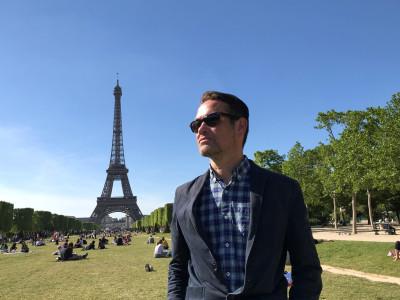 Lots of readers seemed to connect with last week’s blog post which was much more personal than I would normally write. People have thanked me and I’d like to thank everyone who read it and/or got in touch. That means a lot to me.
Lots of readers seemed to connect with last week’s blog post which was much more personal than I would normally write. People have thanked me and I’d like to thank everyone who read it and/or got in touch. That means a lot to me.
Today it’s back to business as usual, if you can call it that: this is only the third time in nine years that anyone other than me has got to write about France on the Sofa. I’m delighted to open the autumn Sofa season by hosting Jude Cook with a Writers on Location about Paris. It’s the setting of his second novel Jacob’s Advice which was crowdfunded on Unbound. My review follows:
Unlike Nick Newman – the narrator of my second novel, Jacob’s Advice, whose father took him to Paris every year – the city has never been ‘in my blood’. Yet, I still feel a deep connection to (or maybe a nostalgia for) The Ville Lumière, one that has deepened over the years. My own father lived and worked in Paris for fifteen years after he separated from my mother, and my twin brother and I visited him for a couple of magical Easter breaks in a row – in 1977, and 1978. We were nine, going on ten, so the city made a huge impression. I’ve been back many times over the years: on an Interrail trip aged 18; then with various girlfriends (one of whom became my wife); and once with the band I formed with my brother. In 1995, we were on a European tour with Echobelly and were scheduled to play the Erotika club in Montmartre, but transport difficulties meant we missed the gig. We ended up staying for a couple of days; busking outside the Pompidou Centre and writing songs in the hotel room. It was a memorable visit, yet never quite so magical as those first boyhood experiences.
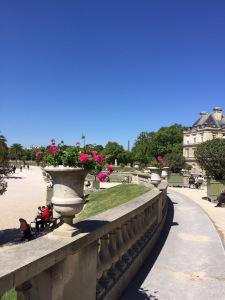
My father’s first apartment was opposite Marie Curie’s old place in the suburbs, with her blue plaque visible from the balcony. At night, I remember the sound of dogs barking endlessly; the sweep of the distinctive yellow French car headlights over the ceiling. When he wasn’t working, my father took us to see the sights: the Eiffel Tour; Invalides, with Napoleon’s monumental sarcophagus; the melting ice cream towers of the Sacré-Cœur. He even managed to lose us in the woods surrounding Versailles, a misadventure our mother never found out about. One night, he drove us to the rue Voltaire to see Close Encounters of the Third Kind in the V.O. – the Version Originale, with French subtitles. It was an immensely exciting experience. As was walking the Champs Élysées at night, with its sparkling cafes and window full of haute couture; the implacable arch with its flame to the unknown soldier dominating the nocturnal cityscape.
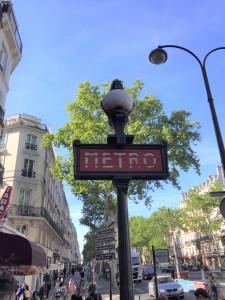
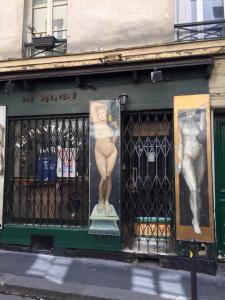
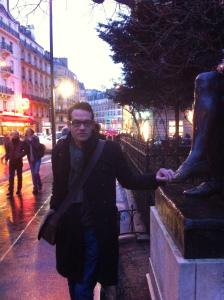
Finally, I found my way back to the boulevard Saint-Michel, where Nick stands on his balcony and watches the sun ‘rise over the place Edmond Rostand like a slice of molten peach’. I went for a quick drink in Le Pantalon on the rue Royer-Collard, Nick’s local bar, one of those dark dives that accepts only cash, and where the Pernod drunks still prop up the bar all day. Then I walked south and found myself back at place Denfert-Rochereau’s famous lion on its pedestal. Here Nick contemplates the ‘underworld kingdom’ of the Catacombs below his feet – ‘those other streets of femurs and skulls’. And it was here where I sat outside a bustling café with un demi in the hour before the train, remembering those boyhood visits with my brother.
Merci, Jude, for this wonderful, nostalgic piece. It fascinates me that we both know Paris so well but in completely different ways!
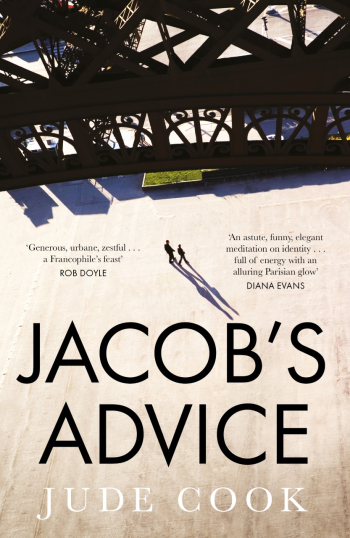
It’s a slight disservice – but also a big compliment – to say that I enjoyed this intellectually stimulating novel most for its vivid and consuming sense of Paris. I could not just picture but feel myself present in every location, which was both pleasurable and painful in a very rare year without France. This study of personal identity takes place against a backdrop of the complex tensions in contemporary French society which, as I know from experience of setting novels there, demands more of the author than familiarity with the physical terrain or reliance on stereotypes. Jude Cook’s impressive grasp of French history and culture really shine through this work.
Elegant and expansive in style and rich in scope of reference and ideas, Jacob’s Advice is a novel that rewards commitment rather than one to dip into – I sank into it for hours at a time and was always eager to return. There is something knowingly Gatsbyesque about narrator Nick in relation to his cousin Larry; I was often frustrated by Nick’s bystander stance and passivity in the face of his own personal problems, but there was a lot more that interested me about this strange, rather one-sided dynamic with elements of sibling rivalry, hero worship and unhealthy obsession. There are some perfectly articulated observations on life, including one of the best lines I’ve ever come across – despite the temptation to quote it, I will leave that discovery to you…

